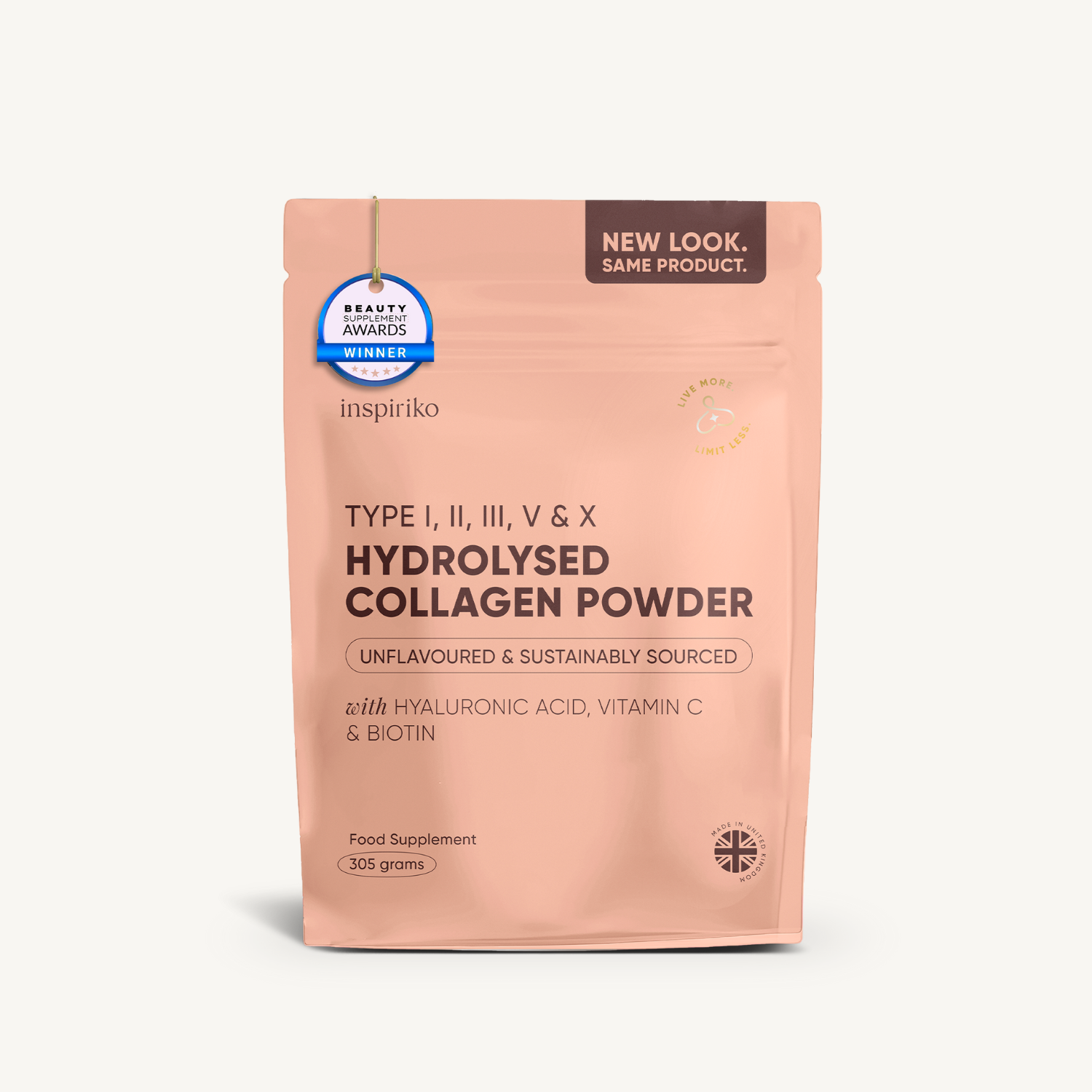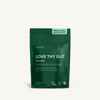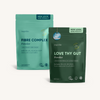Gut health has become one of the most talked-about topics in wellness, and for good reason. Your digestive system is responsible for more than just processing food; it’s closely tied to your immune function, hormones, mental health, and overall well-being. But when it comes to gut issues, women often seem to face more challenges than men. Why is that?
Let’s take a closer look at women’s gut health, the reasons behind the imbalance, and what you can do to support your digestive system naturally.

The Gut - Your Second Brain
Your gut isn't just a digestive pipe; it’s a powerful system of nerves, bacteria, and hormones. Often called the “second brain,” the gut is home to the gut microbiome, a mix of trillions of bacteria that influence not just digestion but also immunity, skin health, and even mood.
When your gut is happy, you feel it: regular digestion, stable energy, balanced mood. But when does it go off? You might deal with symptoms of poor gut health like:
-
Constant bloating
-
Irregular bowel movements
-
Food sensitivities
-
Brain fog or fatigue
-
Skin issues like acne or eczema
-
PMS or period-related flare-ups
These symptoms often show up more in women than men, and here’s why…
The Female Microbiome & What Makes It Unique
The female gut microbiome is structurally and functionally different from men’s, shaped by hormonal changes across the lifespan. Scientific studies have shown that women, even in healthy aging, exhibit distinct microbial profiles compared to men. These differences affect immune responses, stress resistance, and even how the body metabolizes hormones. (1)
But it doesn’t stop there. Hormonal fluctuations during the menstrual cycle, pregnancy, perimenopause, and menopause dramatically influence microbial diversity and balance. Each phase alters the internal environment, impacting how microbes thrive or diminish. For instance, Lactobacillus and Bifidobacterium, two essential gut bacteria, tend to fluctuate in concentration with estrogen and progesterone levels.
These shifts are not just cosmetic; they affect digestion, inflammation, and the body's ability to detoxify hormones. As estrogen declines, especially during menopause, microbial diversity often increases, but beneficial bacteria like Lactobacillus decrease, leading to dysbiosis. Understanding these patterns is key to optimizing women’s gut health through targeted interventions and lifestyle changes. (2)
Think your hormones might be messing with your gut?
Take our 2-minute quiz to find out what's really going on.
Gut Conditions That Disproportionately Affect Women
1. IBS (Irritable Bowel Syndrome): IBS is up to twice as prevalent in women compared to men. According to a prospective study, women, especially postmenopausal women, report significantly more gastrointestinal symptoms, such as bloating and abdominal pain. They also experience heightened somatic symptoms (like joint and muscle pain) and fatigue, often worsened by menstrual or hormonal fluctuations. (3)
2. Constipation: Women are more prone to constipation due to slower gut motility, which is influenced by estrogen and progesterone. Hormonal shifts throughout the menstrual cycle and during menopause can further reduce bowel movement frequency and efficiency.
3. Bloating and Food Sensitivities: Bloating is commonly reported by women and is often linked to food sensitivities, altered gut bacteria, or fluctuating estrogen levels. These sensitivities can make even healthy foods trigger discomfort, contributing to persistent digestive distress that is often unique to women.
Together, these conditions highlight how biological and hormonal differences shape women's gut health in distinct ways.

Gut Health During Menopause - A Perfect Storm?
Menopause brings a wave of changes, and your gut feels it. As oestrogen levels decline, digestion, absorption, and microbiome balance are all affected. This hormonal shift can reduce microbial diversity, weaken the gut lining, and disrupt how nutrients are processed.
Many women notice increased bloating, sluggish digestion, and new food intolerances during this time. Slower gut motility (how fast food moves through your system) can lead to constipation and discomfort. Meanwhile, the drop in estrogen may change how your body reacts to common foods suddenly, dairy or gluten might feel harder to tolerate.
So what helps?
-
Fermented foods such as yogurt, kefir, sauerkraut, and kimchi help restore healthy gut bacteria.
-
A high-fibre diet with plenty of vegetables, legumes, and whole grains supports regularity and feeds your microbiome.
-
Staying hydrated, managing stress, and moving your body daily also help counteract sluggish digestion.
Menopause might stir up gut issues, but the right habits can bring relief.
Gut feeling off during menopause? Here's how to rebalance and feel like yourself again Read now
Natural Ways to Support Women’s Gut Health
Improving gut health doesn’t always require medications; many women benefit from natural strategies that nourish the microbiome and reduce digestive discomfort. Here’s how to improve gut health naturally, backed by science:

1. Probiotic-Rich Foods and Supplements
Probiotics introduce beneficial bacteria into the gut, which is especially helpful for women with imbalanced flora. These beneficial microbes aid digestion, help ease bloating, and also contribute to vaginal health.
Some of the best probiotics for gut health:
-
Fermented foods (kefir, kimchi, miso)
-
Probiotic supplements with Lactobacillus and Bifidobacterium strains
Note: Look for gender-specific formulas designed with hormonal balance in mind.
2. Importance of Fibre
Fibre is the foundation of a balanced digestive system. It helps regulate motility, supports a diverse microbiome, and reduces common symptoms like constipation and bloating. Here are some of the best foods for gut health:
-
Flaxseeds – support estrogen metabolism and feed good bacteria
-
Chia seeds – a natural way to ease digestion and keep things moving gently.
-
Psyllium husk – soaks up water, softens stool, and promotes regular bowel movements
Aim for a variety of fibre sources daily to nourish your gut from all sides.
3. Herbal Remedies that Soothe and Support
Certain herbs are known to calm the digestive system and help with symptoms like bloating, gas, and discomfort.
-
Ginger helps balance the gut by promoting microbial diversity and reducing inflammatory strains (4)
-
Chamomile calms the digestive system and encourages regular gut movement. (5)
-
Peppermint reduces spasms and soothes gut irritation
These herbal tools work well alongside fibre and probiotics, offering natural, non-disruptive ways to feel lighter, more comfortable, and more in tune with your body.
4. Love Thy Gut: A Supplement Designed for Women
Let’s face it, most gut health supplements don’t address the specific needs of women. That’s why we formulated Love Thy Gut: a blend of targeted probiotics, prebiotics, digestive enzymes, and soothing herbs to support real-life women dealing with real-life digestion issues.
Whether you’re bloated before your period, sluggish after meals, or just want to feel lighter and clearer, Inspiriko Love Thy Gut is the perfect solution. It’s more than just another pill; it’s a daily ally in your journey toward feeling good from the inside out.

Conclusion: Your Gut, Your Power
Women’s gut health is complex, but understanding it is empowering. From hormonal swings to menopause shifts, your gut responds to every chapter of your life. And while women may face more digestive challenges than men, they also have unique tools and natural solutions that work with the body, not against it.
By prioritizing gut-nourishing habits like eating probiotic-rich foods, adding fiber, staying active, and exploring trusted herbal remedies, you can start healing from the inside out. The more you care for your gut, the more it will support your energy, mood, hormones, and overall well-being.
Your gut might be your second brain, but it should never be a second priority.
FAQs
Why do I feel bloated all the time, even when I eat healthily?
Do probiotics really help with gut issues?
Should women take fibre supplements?
How can I tell if my gut health is affecting my hormones?
What natural supplements can support my gut health?
Related Products
References for the blog
-
Luan, Y., Liu, C., Yang, S., Zhang, Z., Liu, N., Xu, S., Ma, R., Lu, D. and Zhao, S., 2024. A metagenomics study reveals the gut microbiome as a sex-specific modulator of healthy aging in Hainan centenarians. Mechanisms of Ageing and Development, 222, p.111781.
https://www.sciencedirect.com/science/article/pii/S0531556523002772 -
Nieto, M.R., Rus, M.J., Areal‑Quecuty, V., Lubián‑López, D.M. & Simon‑Soro, A., 2025. Menopausal shift on women’s health and microbial niches. npj Women’s Health, 3, article number 3. doi:10.1038/s44294-024-00050-y
https://www.nature.com/articles/s44294-024-00050-y -
Kim, Y.S. and Kim, N., 2014. Sex and gender differences in irritable bowel syndrome. World Journal of Gastroenterology, 20(5), pp.1227–1235.
https://www.ncbi.nlm.nih.gov/pmc/articles/PMC3569485/ -
Wang, G., Huang, S., Wang, Y., Cai, S., Yu, H., Liu, H., Chen, Y. and Li, Y., 2021. Gut microbiota variation with short-term intake of ginger juice on human health. Frontiers in Microbiology, 12, p.608322.
https://www.ncbi.nlm.nih.gov/pmc/articles/PMC7940200/ -
Díaz, A., Vargas‑Pérez, I., Aguilar‑Cruz, L., Calva‑Rodríguez, R., Treviño, S., Venegas, B. & Contreras‑Mora, I.R., 2014. A mixture of chamomile and star anise has anti‑motility and antidiarrheal activities in mice. Revista Brasileira de Farmacognosia, 24(4), pp.419–424. doi:10.1016/j.bjp.2014.07.016.
https://www.sciencedirect.com/science/article/pii/S0102695X14000489?via%3Dihub





